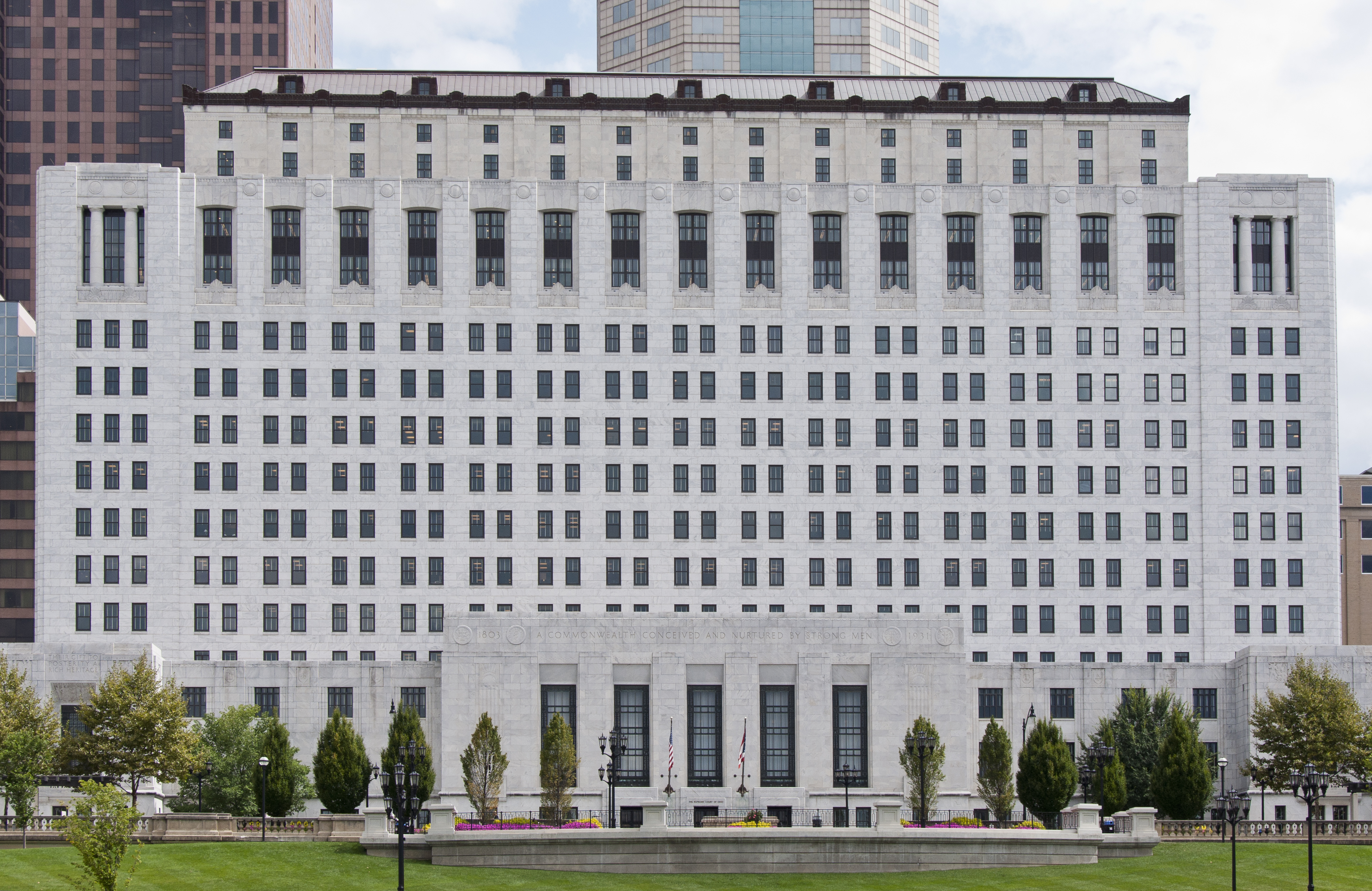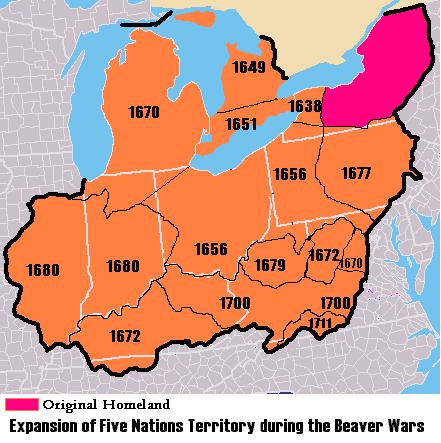|
Ohio Municipal Courts
Municipal Courts and County Courts are law courts of limited jurisdiction in the U.S. state of Ohio. They handle cases involving traffic, non-traffic misdemeanors, evictions and small civil claims (in which the amount in controversy does not exceed $3,000 for small claims and $15,000 for municipal court). These courts also conduct preliminary hearings in felony cases.Judicial System Structure from Municipal courts in Ohio are far more limited in scope than the Common Pleas courts. Ohio's municipal and |
Ohio
Ohio () is a state in the Midwestern region of the United States. Of the fifty U.S. states, it is the 34th-largest by area, and with a population of nearly 11.8 million, is the seventh-most populous and tenth-most densely populated. The state's capital and largest city is Columbus, with the Columbus metro area, Greater Cincinnati, and Greater Cleveland being the largest metropolitan areas. Ohio is bordered by Lake Erie to the north, Pennsylvania to the east, West Virginia to the southeast, Kentucky to the southwest, Indiana to the west, and Michigan to the northwest. Ohio is historically known as the "Buckeye State" after its Ohio buckeye trees, and Ohioans are also known as "Buckeyes". Its state flag is the only non-rectangular flag of all the U.S. states. Ohio takes its name from the Ohio River, which in turn originated from the Seneca word ''ohiːyo'', meaning "good river", "great river", or "large creek". The state arose from the lands west of the Appalachian Mountai ... [...More Info...] [...Related Items...] OR: [Wikipedia] [Google] [Baidu] |
Traffic Court
Traffic court is a specialized judicial process for handling traffic ticket cases. In the United States, people who are given a citation by a police officer can plead guilty and pay the indicated fine directly to the court house, by mail, or on the Internet. A person who wishes to plead not guilty or otherwise contest the charges is required to appear in court on the predetermined date on the citation, where they may argue before the judge or negotiate with the prosecutor before being called to appear in front of the judge. Most prosecutors will not negotiate with someone who does not have a lawyer. The person may also request a trial by a written declaration in the following states: California, Florida, Hawaii, Indiana, Louisiana, Nebraska, Ohio, Oregon, and Wyoming. In the case of a trial by written declaration, the accused does not have to be present in the courtroom; they may just explain the reason to defense for the case. Officers are required to turn in their declaration. The ... [...More Info...] [...Related Items...] OR: [Wikipedia] [Google] [Baidu] |
Misdemeanor
A misdemeanor (American English, spelled misdemeanour elsewhere) is any "lesser" criminal act in some common law legal systems. Misdemeanors are generally punished less severely than more serious felonies, but theoretically more so than administrative infractions (also known as minor, petty, or summary offences) and regulatory offences. Typically, misdemeanors are punished with monetary fines or community service. Distinction between felonies and misdemeanors A misdemeanor is considered a crime of lesser seriousness, and a felony one of greater seriousness. The maximum punishment for a misdemeanor is less than that for a felony under the principle that the punishment should fit the crime. One standard for measurement is the degree to which a crime affects others or society. Measurements of the degree of seriousness of a crime have been developed. In the United States, the federal government generally considers a crime punishable with incarceration for not more than one ... [...More Info...] [...Related Items...] OR: [Wikipedia] [Google] [Baidu] |
Small Claims Court
Small-claims courts have limited jurisdiction to hear civil cases between private litigants. Courts authorized to try small claims may also have other judicial functions, and go by different names in different jurisdictions. For example, it may be known as a county or magistrate's court. These courts can be found in Australia, Brazil, Canada, England and Wales, Hong Kong, Ireland, Israel, New Zealand, Philippines, Scotland, Singapore, South Africa, Nigeria and the United States. Purpose and operation The jurisdiction of small-claims courts typically encompasses private disputes that do not involve large amounts of money. The routine collection of small debts forms a large portion of the cases brought to small-claims courts, as well as evictions and other disputes between landlords and tenants, unless the jurisdiction is already covered by a tenancy board. A small-claims court generally has a maximum monetary limit to the amount of judgments it can award, often in the thousands of ... [...More Info...] [...Related Items...] OR: [Wikipedia] [Google] [Baidu] |
Preliminary Hearing
Within some criminal justice, criminal justice systems, a preliminary hearing, preliminary examination, preliminary inquiry, evidentiary hearing or probable cause hearing is a proceeding, after a criminal complaint has been filed by the prosecutor, to determine whether there is enough evidence to require a trial. At such a hearing, the defendant may be assisted by a lawyer. Canada In Canada, a preliminary hearing is sometimes referred to as a preliminary inquiry. During the preliminary inquiry, a hearing is held by the court to determine if there is enough evidence to justify a trial. Preliminary inquiries are only held when a person is charged with an indictable offence. The Crown Attorney may call witnesses. If there is not enough evidence, the court will dismiss the charge(s). In the aftermath of the R v Jordan (2016), 2016 Jordan decision, in which the Supreme Court of Canada imposed time limits on the Crown to bring criminal cases to trial, the Crown has started to use the I ... [...More Info...] [...Related Items...] OR: [Wikipedia] [Google] [Baidu] |
Supreme Court Of Ohio
The Ohio Supreme Court, Officially known as The Supreme Court of the State of Ohio is the highest court in the U.S. state of Ohio, with final authority over interpretations of Ohio law and the Ohio Constitution. The court has seven members, a chief justice and six associate justices, who are elected at large by the voters of Ohio for six-year terms. The court has a total of 1,550 other employees. Since 2004, the court has met in the Thomas J. Moyer Ohio Judicial Center (formerly known as the Ohio Departments Building) on the east bank of the Scioto River in Downtown Columbus. Prior to 2004, the court met in the James A. Rhodes State Office Tower and earlier in the Judiciary Annex (now the Senate Building) of the Ohio Statehouse. The Ohio Supreme Court and the rest of the judiciary is established and authorized within Article IV of the Ohio Constitution. Justices All the seats on the court are elected at large by the voters of Ohio. Every two years, two of the associate ... [...More Info...] [...Related Items...] OR: [Wikipedia] [Google] [Baidu] |
Ohio Courts Of Common Pleas
Ohio () is a state in the Midwestern region of the United States. Of the fifty U.S. states, it is the 34th-largest by area, and with a population of nearly 11.8 million, is the seventh-most populous and tenth-most densely populated. The state's capital and largest city is Columbus, with the Columbus metro area, Greater Cincinnati, and Greater Cleveland being the largest metropolitan areas. Ohio is bordered by Lake Erie to the north, Pennsylvania to the east, West Virginia to the southeast, Kentucky to the southwest, Indiana to the west, and Michigan to the northwest. Ohio is historically known as the "Buckeye State" after its Ohio buckeye trees, and Ohioans are also known as "Buckeyes". Its state flag is the only non-rectangular flag of all the U.S. states. Ohio takes its name from the Ohio River, which in turn originated from the Seneca word ''ohiːyo'', meaning "good river", "great river", or "large creek". The state arose from the lands west of the Appalachian Moun ... [...More Info...] [...Related Items...] OR: [Wikipedia] [Google] [Baidu] |
County Court
A county court is a court based in or with a jurisdiction covering one or more counties, which are administrative divisions (subnational entities) within a country, not to be confused with the medieval system of ''county courts'' held by the high sheriff of each county. England and Wales Since 2014, England and Wales have had what is officially described as "a single civil court" named the County Court, with unlimited financial jurisdiction. However it should be understood that there are County Court buildings and courtrooms throughout England and Wales, not one single location. It is "a single civil court" in the sense of a single centrally organised and administered court ''system''. Before 2014 there were numerous separate county court systems, each with jurisdiction across England and Wales for enforcement of its orders, but each with a defined "county court district" from which it took claims. County court districts did not have the same boundaries as counties: the name wa ... [...More Info...] [...Related Items...] OR: [Wikipedia] [Google] [Baidu] |
Limited Jurisdiction
Limited jurisdiction, or special jurisdiction, is the court's jurisdiction only on certain types of cases such as bankruptcy, and family matters. Courts of limited jurisdiction, as opposed to general jurisdiction, derive power from an issuing authority, such as a constitution or a statute. Special jurisdiction courts must demonstrate that they are authorized to exert jurisdiction under their issuing authority. In contrast, general jurisdiction courts need only to demonstrate that they may assert in personal jurisdiction over a party. Differences Sometimes the term "special courts" is used to refer to courts of limited jurisdiction: "Special courts" has unfortunate connotations, however, because the designation is often given by totalitarian governments to tribunals set up to persecute government opponents or otherwise help commit human rights abuses. That is a different kind of justice: not because it does not confer upon courts the power to hear only certain types of cases; but a ... [...More Info...] [...Related Items...] OR: [Wikipedia] [Google] [Baidu] |
Court Of Record
A court of record is a trial court or appellate court in which a record of the proceedings is captured and preserved, for the possibility of appeal. A court clerk or a court reporter takes down a record of oral proceedings. That written record (and all other evidence) is preserved at least long enough for all appeals to be exhausted, or for some further period of time provided by law (for example, in some U.S. states, death penalty statutes provide that all evidence must be preserved for an extended period of time). Most courts of record have rules of procedure (see rules of evidence, rules of civil procedure, and rules of criminal procedure) and therefore they require that most parties be represented by counsel (specifically, attorneys holding a license to practice law before the specific tribunal). In contrast, in courts not of record, oral proceedings are not recorded, and the judge makes his or her decision based on notes and memory. In most "not of record" proceedin ... [...More Info...] [...Related Items...] OR: [Wikipedia] [Google] [Baidu] |
Ohio Revised Code
The ''Ohio Revised Code'' contains all current statutes of the Ohio General Assembly of a permanent and general nature, consolidated into provisions, titles, chapters and sections. However, the only official publication of the enactments of the General Assembly is the ''Laws of Ohio''; the ''Ohio Revised Code'' is only a reference. The ''Ohio Revised Code'' is not officially printed, but there are several unofficial but certified (by the Ohio Secretary of State) commercial publications: ''Baldwin's Ohio Revised Code Annotated'' and ''Page's Ohio Revised Code Annotated'' are annotated, while ''Anderson's Ohio Revised Code Unannotated'' is not. ''Baldwin's'' is available online from Westlaw and ''Page's'' is available online from LexisNexis. History The ''Ohio Revised Code'' replaced the ''Ohio General Code'' in 1953.http://www.lexisnexis.com/infopro/zimmerman/disp.aspx?z=1794. ''URL accessed 15 September 2006.'' However the current organization and form of the ''Ohio Revised Code' ... [...More Info...] [...Related Items...] OR: [Wikipedia] [Google] [Baidu] |
Subject-matter Jurisdiction
Subject-matter jurisdiction (also called jurisdiction ''ratione materiae')'' is the authority of a court to hear cases of a particular type or cases relating to a specific subject matter. For instance, bankruptcy court only has the authority to hear bankruptcy cases. Subject-matter jurisdiction must be distinguished from personal jurisdiction, which is the power of a court to render a judgment against a particular defendant, and territorial jurisdiction, which is the power of the court to render a judgment concerning events that have occurred within a well-defined territory. Unlike personal or territorial jurisdiction, lack of subject-matter jurisdiction cannot be waived. A judgment from a court that did not have subject-matter jurisdiction is forever a nullity. To decide a case, a court must have a combination of subject (''subjectam'') and either personal (''personam'') or territorial (''locum'') jurisdiction. Subject-matter jurisdiction, personal or territorial jurisdictio ... [...More Info...] [...Related Items...] OR: [Wikipedia] [Google] [Baidu] |





